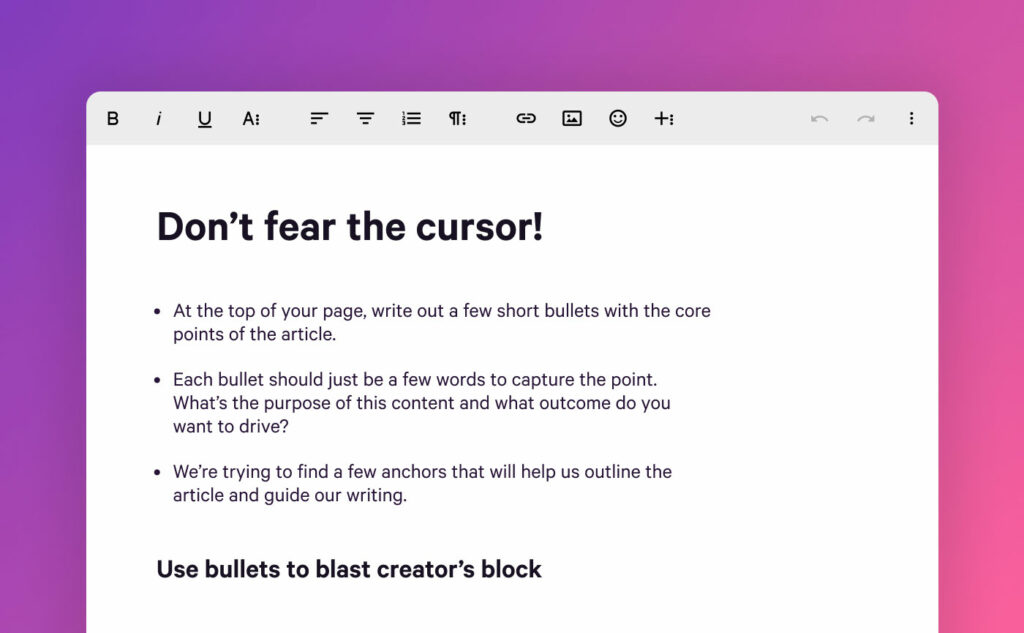How to defeat the blinking cursor and start writing for growth
Although I did just finish writing a book, I don’t actually consider myself a writer. Well, not compared to people who are actually writers. Although I do write a good bit for the different projects I’m juggling, historically, I’ve done it out of necessity rather than the pure joy of it.
However, the more I write and practice writing, the more I understand the deep and hidden value behind being a good writer and communicator. It’s not just about getting better at writing articles that can sell goods. It’s about becoming a better writer that can effectively communicate everything, whether it’s encouraging an audience to buy something, or writing an email that changes the trajectory of your life.
Good writing is good business
Content marketing, email marketing, educational content, social media, and sharp website copy are all table stakes for creative professionals (and virtually every business) these days. You simply can’t opt out if you want to stand out or compete.
You can have the best product, service, or portfolio in the world, but if you’re not able to effectively communicate its value, you’re going to have a hard time convincing anyone to buy it.
That’s why we absolutely have to step up our writing game! I know, it can feel excruciating opening up a blank page and watching the cursor blink menacingly at you. “Where do I even start? I can’t even get past my first line…” It generates enough anxiety to just call it quits altogether.
LEARN TO WRITE OR HIRE SOMEONE WHO CAN
You simply can’t opt out if you want to stand out or compete in a crowded space. Spoiler alert, all spaces are crowded.
But if we give up and let the blinking cursor win (like I did for far too many years), we never get better at it, and we put ourselves at a clear disadvantage with every project we launch.
I’m happy to tell you, it doesn’t have to be that hard. It just takes a little rewiring. I’ve picked up enough tips and tricks along the way to take the sting out of writing and I think they can help you too.
Start with bullets
Don’t get overwhelmed by the fact that you haven’t written one word yet. You’re not responsible for a masterpiece here. You just need to get your core ideas down in a bulleted list so you have something to work from. Easy enough, right?
At the top of your page, write out a few short bullets with the core points of the article. Each bullet should just be a few words to capture the point. What’s the purpose of this content and what outcome do you want to drive? We’re trying to find a few anchors that will help us outline the article and guide our writing. You might even consider using The Hulk Summary.

This should help you get a few paragraphs going under each heading. I’ll even create another bulleted list under each new heading to consolidate ideas for the section and expand on the bullets accordingly.
This bulleted list technique can add much needed focus and structure for folks like me who have all. the. ideas. floating around in our heads but have a hard time organizing them on the page.
Starting with bullets is a great way to break away from a blank page. It’s much easier to expand on bullet points than it is to write long-form sentences from the get-go.
Stick to the formula
While working with my editor on the Liftoff book, she gave me a handy outline to keep in mind for each chapter. By sticking to this outline, I was able to keep a consistent structure from chapter to chapter.
After using it on a few chapters, my writing started to speed up because I was struggling a lot less with the arc of each chapter. Instead, I was able to focus more on what I was trying to say.
Although I used this for writing a book, it works just as well for stuff like blog posts, content marketing, and email marketing.
- A clear problem statement. Near the beginning of the article, set up the problem you’re going to knock down. Hook the reader in and set some expectations about how it’s going to provide them value.
- Make your points succinctly. No one wants to scan rambling blog posts, hunting for the valuable tips they were promised. Deliver the goods already! Use descriptive headings to break up content into digestible and actionable sections that help the reader consume the content efficiently.
- A personal anecdote. Adding a personal touch that highlights your experience with the subject matter can add authenticity to your writing. The reader isn’t just there for the content, they’re there because they trust your voice.
- A clear conclusion. Sum up the highlights of the article and give the reader their call to action. If your content was valuable, it’s a much easier ask to get them to click a CTA button.
Write for value, not clicks
Guess what? Your audience visits a ton of websites every day. And each one is trying to get something from them. We’re no different. So how do we stand out from the sea of CTAs and engage in a more meaningful way to earn their clicks and, hopefully, purchases?
The key is to throw the CTA out the window, for now. Focus on the value you can provide first. Content marketing is a strategy that focuses on creating and sharing valuable, relevant, and consistent content to grow and retain an engaged audience.
Content marketing zooms in on what makes your audience tick. It focuses on the topics they’re deeply interested in learning about and provides answers to their most common questions.
FOCUS ON VALUE, THE CLICKS WILL FOLLOW
The key is to throw the CTA out the window, for now. Focus on the value you can provide first. Valuable, relevant, and consistent content wins.
Instead of pitching your products or services up front, you are providing truly relevant and useful content to your readers and customers. You’re helping them learn new things and resolving their issues. The reward is a loyal, targeted, action-oriented audience — the holy grail.
By focusing on content that is highly relevant to your audience, you can build trust and authority around your brand and your products while leading readers towards an eventual purchase.
Once your readers associate your brand with value, knowledge, and helpfulness, convincing them that your product is the solution to their problem becomes significantly easier.
The hardest part is getting started
Writing is a skill that few are naturally gifted with — I’m certainly not. It’s something you have to keep doing over and over before you start to hit your stride. There are no shortcuts.
That being said, it’s one of the most universally valuable skills you can add to your toolbox! It can help you sell more, get better jobs, communicate more effectively, and connect more genuinely with your audience. If you’re looking for growth hacks, there are few more effective than sharp writing.
- Kill the blinking cursor with some bullet points to quickly get some text on the page that you can elaborate on.
- Stick to a formula! You don’t have to reinvent the wheel with every piece that you write. Set up the problem, articulate the pain points, introduce the solution, and save the day.
- Deliver value above all. Keep your content succinct, easily scannable, and goal-oriented. Readers and search engines alike will reward you for it.
I hope that helps you get started on your next piece of writing! As I continue to sharpen my skills as a writer, I’ll share more thoughts and writing tips here.
Until then, you might consider grabbing the full Liftoff Course, where I go deep into building audiences, creating products that people love, automating growth, and so much more.





